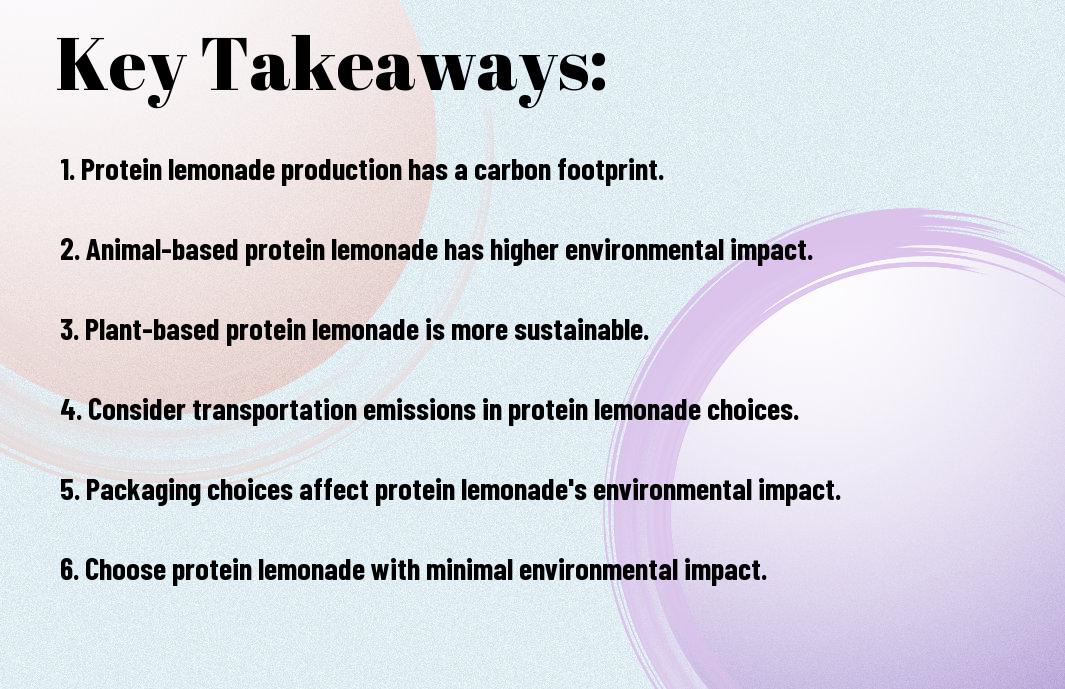Many of us enjoy sipping on refreshing protein lemonades for a boost of energy and nutrition, but have you ever stopped to think about the environmental impact of this trendy beverage? From production to packaging, protein lemonade can leave a significant carbon footprint on our planet. Understanding the ecological consequences of our food and drink choices is crucial in making sustainable decisions. Let’s examine the facts about protein lemonade and discover what we can do to reduce its environmental impact.

Ingredients Unpeeled: What’s in Your Protein Lemonade?
Sourcing of Lemons: A Citrusy Concern
It’s important to consider where the lemons in your protein lemonade come from. The process of sourcing lemons can have a significant impact on the environment. Look for brands that support sustainable farming practices and prioritize organic options to minimize pesticide use. By choosing responsibly sourced lemons, you can enjoy your refreshing drink with a clear conscience.
The Protein Twist: Analyzing the Sources
With protein being a key component of protein lemonade, understanding where it comes from is crucial. When opting for a protein lemonade, pay attention to the sources of protein used. Opt for plant-based proteins like pea protein or grass-fed whey protein to reduce your carbon footprint. Avoid products containing soy protein concentrate or whey protein isolate that may have negative environmental impacts.
Mixing It Up: Production & Packaging
The Making of a Refreshing Concoction
You might be wondering how your favorite protein lemonade is made. With a careful process that involves mixing high-quality protein powders with fresh lemon juice and water, each batch is crafted to perfection. The result is a delicious and nutritious drink that can boost your energy levels and keep you feeling refreshed throughout the day.
Bottles and Boxes: The Packaging Predicament
On the topic of packaging, the bottles and boxes that hold your protein lemonade can have a significant impact on the environment. The use of single-use plastic bottles and excessive packaging materials can contribute to pollution and waste problems. It’s important to consider the sustainability of the packaging when choosing your favorite protein drink.
To make a positive impact, opt for brands that use recyclable and biodegradable packaging options. By supporting companies that prioritize eco-friendly packaging solutions, you can help reduce the environmental footprint of your protein lemonade consumption. Recall, every small choice you make can contribute to a greener future for our planet.
Transportation: The Journey From Grove to Glass
Carbon Footprint of Delivery Trucks
Unlike many other beverages, protein lemonade requires specialized delivery trucks to ensure it reaches consumers fresh and ready to drink. An assessment of the carbon footprint of these delivery trucks reveals a significant impact on the environment.
Refrigeration and Energy Use
The refrigeration and energy use involved in storing and transporting protein lemonade can also contribute to its environmental impact. The energy required to keep the product cold during transportation and in retail stores is not insignificant.
Refrigeration is a crucial aspect of ensuring that protein lemonade maintains its freshness and quality from grove to glass. Efficient refrigeration systems can help reduce energy consumption and minimize the product’s overall environmental footprint. It is important for producers and retailers to prioritize sustainable refrigeration practices to lessen the impact on the planet.
Your Choices, Your Impact
Once again, as consumers, our choices can significantly impact the environment. Pertaining to protein lemonade, it’s necessary to be aware of the ingredients and their sourcing. According to Consumer Reports, arsenic and lead contamination in fruit juices are a real concern, highlighting the importance of making informed decisions about what we consume.
Choosing Eco-Friendly Brands
With the rise in eco-conscious consumers, many brands are now prioritizing sustainability in their production processes. When deciding on a protein lemonade brand, look for companies that use organic ingredients, prioritize ethical sourcing, and use eco-friendly packaging. Supporting environmentally responsible brands can make a positive impact on the planet.
Homemade Alternatives: A Recipe for Sustainability
Your love for protein lemonade doesn’t have to harm the environment. Consider making your own at home using fresh, locally sourced ingredients. Not only can you control the quality of the ingredients, but you can also reduce waste by using reusable containers. Homemade protein lemonade is not only better for the environment but also allows you to customize the flavor to your liking.
Eco-friendly choices, whether in the brands we support or the products we make at home, can go a long way in reducing our environmental footprint. By being mindful of our choices, we can enjoy our protein lemonade guilt-free, knowing we are making a positive impact on the planet.
Conclusively
Thus, it is crucial to be aware of the environmental impact of protein lemonade in order to make more sustainable choices. By choosing plant-based protein sources, reducing single-use plastic packaging, and supporting eco-friendly brands, we can all play a part in reducing our carbon footprint and protecting the environment. Let’s continue to educate ourselves and make conscious decisions to create a healthier planet for current and future generations.
FAQ
Q: What is protein lemonade?
A: Protein lemonade is a refreshing drink made with lemonade mixed with protein powder, providing a tasty way to increase protein intake.
Q: What are the environmental impacts of protein lemonade?
A: The environmental impacts of protein lemonade can vary, but factors such as sourcing of ingredients, packaging, and transportation can all contribute to its overall impact.
Q: How can the sourcing of ingredients affect the environmental impact of protein lemonade?
A: The sourcing of ingredients for protein lemonade, such as where the lemons and protein powder are sourced from, can impact the environment through factors like water usage, pesticide use, and transportation emissions.
Q: What are some ways to reduce the environmental impact of protein lemonade?
A: To reduce the environmental impact of protein lemonade, consider using locally sourced ingredients, opting for biodegradable packaging, and choosing eco-friendly transportation methods.
Q: Is there a way to enjoy protein lemonade while being mindful of the environment?
A: Yes! By being conscious of the ingredients you use, where they come from, and how the product is packaged and transported, you can enjoy protein lemonade while minimizing its environmental impact.
